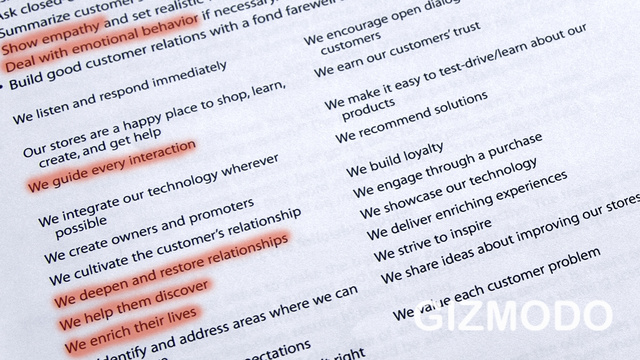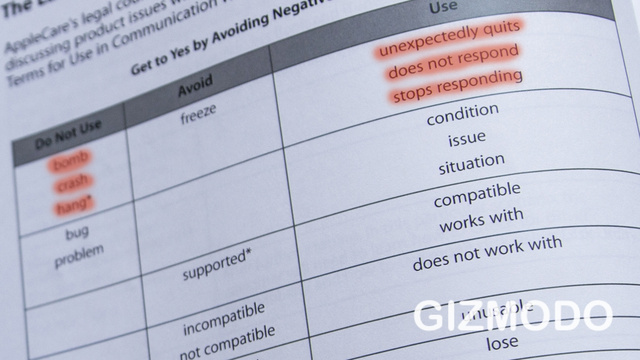Customer Guidelines for Apple Technical Support staff
A very interesting document of Genius Training Student Workbook is cited by the Gizmodo reviewers as one example of reference marketing, of which Apple is a recognized apologist. The document describes words and phrases that Apple’s “support” staff should use when communicating with customers to make the most favorable impression on the current and potential audience, describes psychological markers that allow them to recognize the emotional state of a person who needs advice and role-playing games, which Apple employees must regularly attend, whose primary responsibility is to communicate with the company's customers.
“To sell is a science that can be described with the words (A) pproach, (P) robe, (P) resent, (L) isten, (E) nd.” - following these five principles in relation to the customer, an Apple store employee should build interaction with him. In fact, it is proposed that a person be approached without any pressure, so that the client felt that he had independently made a purchase decision, offered him a choice of company solutions, be sure to offer to try working with the device (this is well illustrated by the trick already mentioned on Habré "... every morning Windows and MacBook display tilts exactly 70 °, they use a program on tablets to measure the angle, which is considered to be the most inconvenient viewing angle: every visitor will immediately pull his hands to the laptop To tilt the display back and as soon as he touches it -. The goal is achieved the way, for the same purpose in the demonstration laptops pre-installed a lot of programs and have an Internet connection The main thing that the user has touched and began to work with the device ") and elegant... complete the communication so that the potential buyer doesn’t even have the thought of moral inconvenience that he received, surveying a device that costs more than its competitors and is not yet ready to purchase.
Buyer : This Mac is too expensive.
Employee : I see what you have in mind. I also think that the price is a bit high, but I think that it is justified by the pre-installed software and other features.
')
“Empathy” - in other words, understanding the emotional state of another person is also embedded in phrases that technical support staff must use to communicate with customers. For example, phrases like “I understand how you feel” should, according to the document, evoke an emotional connection with the employee of the company that subconsciously will form a positive attitude. At the same time, the employee is forbidden to apologize for the possible device operation that is incorrect or incorrect from the client’s point of view, and it should, even in obvious cases, be expressed with sympathetic and empathetic phrases - “I really regret that it happened and you spilled soda on a laptop”

Forming a positive attitude to Apple products is also inherent in the phrases that should be used by employees when communicating with customers. For example, the words “ stuck ” or “ broken ” are forbidden to use - instead they should be used more neutral “ suddenly stopped working ” and “ stopped responding to actions ”. Words like " bug " or " problem " are also forbidden - instead, they are offered much less emotional equivalents of " situation " or " state ". Also, the harsh "incompatible" [device] must necessarily be replaced by an employee with a more courteous "It simply does not work with ...".
Buyer : There is something wrong with the operating system.
Employee : You might think that no, is not it. It turns out that this is simply not supported in this version.

[ Source ]
“To sell is a science that can be described with the words (A) pproach, (P) robe, (P) resent, (L) isten, (E) nd.” - following these five principles in relation to the customer, an Apple store employee should build interaction with him. In fact, it is proposed that a person be approached without any pressure, so that the client felt that he had independently made a purchase decision, offered him a choice of company solutions, be sure to offer to try working with the device (this is well illustrated by the trick already mentioned on Habré "... every morning Windows and MacBook display tilts exactly 70 °, they use a program on tablets to measure the angle, which is considered to be the most inconvenient viewing angle: every visitor will immediately pull his hands to the laptop To tilt the display back and as soon as he touches it -. The goal is achieved the way, for the same purpose in the demonstration laptops pre-installed a lot of programs and have an Internet connection The main thing that the user has touched and began to work with the device ") and elegant... complete the communication so that the potential buyer doesn’t even have the thought of moral inconvenience that he received, surveying a device that costs more than its competitors and is not yet ready to purchase.
Buyer : This Mac is too expensive.
Employee : I see what you have in mind. I also think that the price is a bit high, but I think that it is justified by the pre-installed software and other features.
Original
Customer: This Mac is just too expensive.
Genius: I can see how this way. I found it’s a real value because of all the built-in software and capabilities.
Customer: This Mac is just too expensive.
Genius: I can see how this way. I found it’s a real value because of all the built-in software and capabilities.
')
“Empathy” - in other words, understanding the emotional state of another person is also embedded in phrases that technical support staff must use to communicate with customers. For example, phrases like “I understand how you feel” should, according to the document, evoke an emotional connection with the employee of the company that subconsciously will form a positive attitude. At the same time, the employee is forbidden to apologize for the possible device operation that is incorrect or incorrect from the client’s point of view, and it should, even in obvious cases, be expressed with sympathetic and empathetic phrases - “I really regret that it happened and you spilled soda on a laptop”

Forming a positive attitude to Apple products is also inherent in the phrases that should be used by employees when communicating with customers. For example, the words “ stuck ” or “ broken ” are forbidden to use - instead they should be used more neutral “ suddenly stopped working ” and “ stopped responding to actions ”. Words like " bug " or " problem " are also forbidden - instead, they are offered much less emotional equivalents of " situation " or " state ". Also, the harsh "incompatible" [device] must necessarily be replaced by an employee with a more courteous "It simply does not work with ...".
Buyer : There is something wrong with the operating system.
Employee : You might think that no, is not it. It turns out that this is simply not supported in this version.
Hidden text
Customer: The OS is not supported.
Genius: You'd think not, you wouldn't. Turns out it is supported in this version.
Customer: The OS is not supported.
Genius: You'd think not, you wouldn't. Turns out it is supported in this version.

[ Source ]
Source: https://habr.com/ru/post/150446/
All Articles